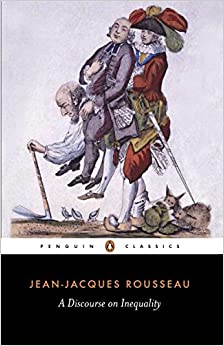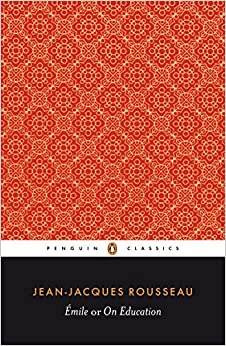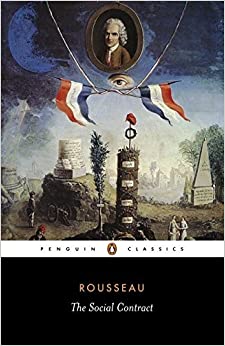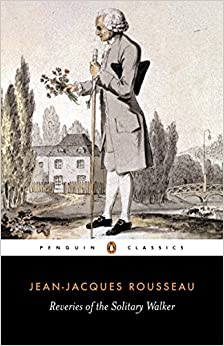Background
Jean-Jacques Rousseau was born on June 28, 1712, in Geneva, Switzerland, to Suzanne Bernard and Isaac Rousseau.

France, color engraving of philosopher Jean-Jacques Rousseau
Portrait of Jean-Jacques Rousseau (Geneva, 1712-Ermenonville, 1778), Swiss writer, philosopher, and musician, wearing an Armenian costume. Pastel, 18th century.
Jean-Jacques Rousseau collecting plants in Ermenonville, 18th century, France.







(In A Discourse on Inequality, Rousseau sets out to demons...)
In A Discourse on Inequality, Rousseau sets out to demonstrate how the growth of civilization corrupts man’s natural happiness and freedom by creating artificial inequalities of wealth, power, and social privilege. Contending that primitive man was equal to his fellows, Rousseau believed that as societies become more sophisticated, the strongest and most intelligent members of the community gain an unnatural advantage over their weaker brethren, and that constitutions set up to rectify these imbalances through peace and justice, in fact, do nothing but perpetuate them. Rousseau's political and social arguments in the Discourse were a hugely influential denunciation of the social conditions of his time and one of the most revolutionary documents of the eighteenth-century.
https://www.amazon.com/Discourse-Inequality-Penguin-Classics/dp/0140444394/ref=sr_1_5?dchild=1&keywords=Jean-Jacques+Rousseau&qid=1599863517&sr=8-5
1755

(This novel is a story of how Rousseau would have raised s...)
This novel is a story of how Rousseau would have raised such a child placed in his charge. As full-time governor of Emile, Rousseau begins his study, not with the intent of discovering how the boy would grow into manhood, but with the conscious intent of shaping and controlling Emile's maturation.
https://www.amazon.com/Emile-Education-Jean-Jacques-Rousseau/dp/0140445633/ref=sr_1_4?dchild=1&keywords=Jean-Jacques+Rousseau&qid=1599863517&sr=8-4
1762

(Rejecting the view that anyone has a natural right to wie...)
Rejecting the view that anyone has a natural right to wield authority over others, Rousseau argues instead for a pact, or "social contract," that should exist between all the citizens of a state and that should be the source of sovereign power. From this fundamental premise, he goes on to consider issues of liberty and law, freedom and justice, arriving at a view of society that has seemed to some a blueprint for totalitarianism, to others a declaration of democratic principles.
https://www.amazon.com/Social-Contract-Penguin-Books-Philosophy/dp/0140442014/ref=sr_1_3?dchild=1&keywords=Jean-Jacques+Rousseau&qid=1599863517&sr=8-3
1762

(Ten meditations written in the two years before Rousseau'...)
Ten meditations written in the two years before Rousseau's death in 1778 provide an excellent introduction to the thinker's complex world, expressing in its full force the agony of isolation and alienation.
https://www.amazon.com/Reveries-Solitary-Walker-Penguin-Classics/dp/0140443630/ref=sr_1_6?dchild=1&keywords=Jean-Jacques+Rousseau&qid=1599863517&sr=8-6
1782

(Jean-Jacques Rousseau (1712-1778) argued passionately aga...)
Jean-Jacques Rousseau (1712-1778) argued passionately against the inequality he believed to be intrinsic to civilized society. In his Confessions, he relives the first fifty-three years of his radical life with vivid immediacy - from his earliest years, where we can see the source of his belief in the innocence of childhood, through the development of his philosophical and political ideas, his struggle against the French authorities and exile from France following the publication of Emile. Depicting a life of adventure, persecution, paranoia, and brilliant achievement, The Confessions is a landmark work by one of the greatest thinkers of the Enlightenment, which was a direct influence upon the work of Proust, Goethe, and Tolstoy among others.
https://www.amazon.com/Confessions-Penguin-Classics-Jean-Jacques-Rousseau/dp/014044033X/ref=sr_1_8?dchild=1&keywords=Jean-Jacques+Rousseau&qid=1599863517&sr=8-8
1782
Jean-Jacques Rousseau was born on June 28, 1712, in Geneva, Switzerland, to Suzanne Bernard and Isaac Rousseau.
Nine days after Jean-Jacques Rousseau's birth his mother died. At the age of three, he was reading French novels with his father, and Jean-Jacques acquired his passion for music from his aunt. His father fled Geneva to avoid imprisonment when Jean-Jacques was ten.
By the time Jean-Jacques was thirteen, his formal education had ended and he was sent to work for a notary public (someone legally empowered to certify documents), but he was soon dismissed as fit only for watchmaking. Afterward, Rousseau spent three miserable years serving as a watchmaker, which he abandoned when he found himself unexpectedly locked out of the city by its closed gates. He faced the world with no money or belongings and no obvious talents.
Rousseau found himself on Palm Sunday, 1728, in Annecy, France, at the house of Louise Eleonore, Baronne de Warens. Rousseau lived under her roof off and on for thirteen years and was dominated by her influence. Charming and clever, a natural businesswoman, Madame de Warens was a woman who lived by her wits. She supported him and found him jobs, most of which he disliked. A friend, after examining the lad, informed her that he might aspire to become a village curé (priest) but nothing more. Still, Rousseau read, studied, and thought. He pursued music and gave lessons, and for a time he worked as a tutor.
Rousseau's scheme for musical notation, published in 1743 as Dissertation sur la musique moderne, brought him neither fame nor fortune - only a fond letter from the Académie des Sciences. But his interest in music spurred him to write two operas - Les Muses galantes (1742) and Le Devin du village (1752) - and permitted him to write articles on music for Denis Diderot's (1713-1784) Encyclopédie; the Lettre sur la musique française (1753) and the Dictionnaire de musique, published in 1767.
From September 1743 until August 1744 Rousseau served as secretary to the French ambassador to Venice, Italy. He experienced at firsthand the stupidity and corruption (dishonesty and deception) involved in these offices. Rousseau spent the remaining years before his success with his first Discours in Paris, where he lived the poor lifestyle of a struggling intellectual.
By 1749 Rousseau had befriended the French philosopher Diderot. The publication of Diderot's Lettre sur les aveugles had resulted in his imprisonment at Vincennes, France. While walking to Vincennes to visit Diderot, Rousseau read an announcement of a prize being offered by the Dijon Academy for the best essay on the question, "Has progress of the arts and sciences contributed more to the corruption or to the purification of morals?" Rousseau won the prize of the Dijon Academy with his Discours sur les sciences et les arts. His famous "attack" on civilization called for sixty-eight articles defending the arts and sciences. Though he himself regarded this essay as "the weakest in argument and the poorest in harmony and proportion" of all his works, he nonetheless believed that it sounded one of his essential themes: the arts and sciences, instead of freeing men and increasing their happiness, had for the most part imprisoned men further.
Rousseau's novel La Nouvelle Héloïse (1761) attempted to portray in fiction the sufferings and tragedy that foolish education and restrictive social customs had among sensitive creatures. Rousseau's two other major writings - L'émile ou de l'éducation (1762) and Du contrat social (1762) - undertook the more difficult task of constructing an education and a social order that would enable men to be natural and free; that is, to enable men to recognize no bondage except the bondage of natural necessity. To be free in this sense, said Rousseau, was to be happy.
La Nouvelle Héloïse appeared in Paris in January 1761. Originally entitled Lettres de deux amants, habitants d'une petite ville au pied des Alpes, the work was structurally a novel in letters, after the fashion of the English author Samuel Richardson (1689-1761). The originality of the novel won it harsh reviews, but its sexual nature made it immensely popular with the public. It remained a best seller until the French Revolution in 1789, a massive uprising calling for political and social change throughout France.
The reputation of La Nouvelle Héloïse was nothing compared to the storm produced by L'émile and Du contrat social. Even today the ideas set forth in these works are revolutionary. Their expression, especially in L'émile, in a style both readable and alluring made them dangerous. L'émile was condemned (officially disapproved of) by the Paris Parliament (the governing body) and heavily criticized by the archbishop of Paris. Both of the books were burned by the authorities in Geneva, Switzerland.
Forced to flee from France, Rousseau sought refuge at Yverdon in the territory of Bern. There he was kicked out by the Bernese authorities and would spend the next few years seeking a safe place to live. Finally, British philosopher David Hume (1711-1776) helped Rousseau settle in Wotton, Derbyshire, England, in 1766. Hume managed to obtain from George III (1738-1820) a yearly pension (sum of money) for Rousseau. But Rousseau, falsely believing Hume to be in league with his Parisian and Genevan enemies, not only refused the pension but also openly broke with the philosopher.
Rousseau returned to France in June 1767 under the protection of the Prince de Conti. Wandering from place to place, he at last settled in 1770 in Paris. There he made a living, as he often had in the past, by copying music. By December 1770 the Confessions, upon which he had been working since 1766, was completed, and he gave readings from this work at various private homes. His last work, Les Rêveries du promeneur solitaire, begun in 1776 and unfinished at his death, records how Rousseau, an outcast from society, recaptured "serenity, tranquility, peace, even happiness."
In May 1778 Rousseau accepted Marquis de Giradin's hospitality at Ermenonville near Paris. There, with Thérèse at his bedside, he died on July 2, 1778, probably from uremia, a severe kidney disease. Rousseau was buried on the Île des Peupliers at Ermenonville. In October 1794 his remains were transferred to the Panthéon in Paris.
Jean-Jacques Rousseau remains a highly influential figure. He was one of the premier Enlightenment thinkers. His views toward nature and "savage" man helped shape 19th century Romanticism. His views about man being essentially good but corrupted by society continue to define the contours of discussion within the field of sociology. The ideas he set forth in Emile helped give rise to the modern "child-centered" theory of education. And of course, as mentioned above, many scholars suggest Rousseau's political ideas, along with others, helped bring about the French Revolution.
(Rejecting the view that anyone has a natural right to wie...)
1762(In A Discourse on Inequality, Rousseau sets out to demons...)
1755(Ten meditations written in the two years before Rousseau'...)
1782(Jean-Jacques Rousseau (1712-1778) argued passionately aga...)
1782(This novel is a story of how Rousseau would have raised s...)
1762Having converted to Roman Catholicism early in life and returned to the austere Calvinism of his native Geneva as part of his period of moral reform, Rousseau maintained a profession of that religious philosophy and of John Calvin as a modern lawgiver throughout the remainder of his life.
His views on religion presented in his works of philosophy, however, may strike some as discordant with the doctrines of both Catholicism and Calvinism. He saw the presence of God in his creation, including mankind, which, apart from the harmful influence of society, is good, because God is good.
Rousseau preferred a direct democracy to a representative government such as England's, but his writings on Poland and Corsica show that he understood that different societies needed differing political institutions.
He was a passionate defender of individual freedom and private property, a socialist, a collectivist totalitarian, a superb critic of the social order, and a silly and pernicious utopian. Rousseau's political writings more concerned with immediate application include his Considérations sur le gouvernement de la Pologne (1772) and his incomplete Projet de constitution pour la Corse, published posthumously in 1862.
Rousseau's idea of human nature being essentially good was a radical departure from the centuries-old Christian doctrine of original sin. This theological view asserted that all human beings are inherently sinful, or evil from birth. Rousseau rejected this view and suggested mankind at its core was not "bad" but "good."
According to Rousseau, man in his "savage" (meaning "uncivilized") state represented the ideal human condition. "Savage" man, he argued, was endowed with "natural goodness," compassion, and was truly free. Society, as Rousseau saw it, was responsible for creating an artificial political system, which resulted in inequality and a host of other evils.
Rousseau wrote a number of important works, with his Discourse on Inequality being among the most well-known. Published in 1755 and formally titled Discourse on the Origin and Basis of Inequality Among Men, this work set forth Rousseau's basic ideas regarding human nature as it relates to political structures. In a nutshell, this work advanced the view that inequality stemmed from restrictive attempts to civilize man. Another important work by Rousseau was The Social Contract. This work explored the relationship between the individual and political authority within the context of republicanism.
Rousseau also addressed issues of education. In his work Emile: or, On Education, Rousseau advanced an informal educational approach. In this work, a young boy, Emile, learns the value of reason and virtue on his own out in the countryside, away from the corruption of the city. He is allowed to make his own mistakes and figure things out for himself. You get the point here. Rousseau's approach is basically the opposite of what we think of as "indoctrination."
There are reoccurring patterns in Rousseau's thoughts. Namely, that the primitive natural state is good and that "civilization" is artificial, restricting, and basically bad. It is a society that corrupts the human person. Man needs to get back to his natural state. That is Rousseau in a nutshell.
Because of his wayward opinions, difficult character, and a supposed persecution complex, Rousseau more and more came into conflict with other intellectuals, among them his friend Denis Diderot, his lifelong enemy Voltaire, his later defender David Hume, and even French musicians.
Physical Characteristics: From birth, Rousseau suffered from a bladder deformation. From 1748 onward his condition had grown worse.
Quotes from others about the person
One interpreter has called Rousseau "an irresponsible writer with a fatal gift for epigram."
In March 1745 Rousseau began an affair with Thérèse Le Vasseur. She was twenty-four years old, a maid at Rousseau's lodgings. She remained with him for the rest of his life - as a mistress, housekeeper, mother of his children, and finally, in 1768, as his wife. They had five children - though some biographers have questioned whether any of them were Rousseau's. Apparently he regarded them as his own even though he assigned them to a hospital for abandoned children. Rousseau had no means to educate them, and he reasoned that they would be better raised as workers and peasants by the state.
